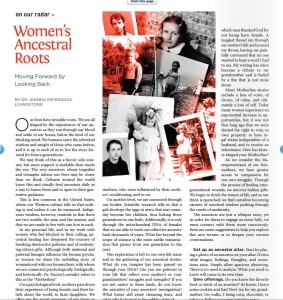My Published Articles
[fullwidth backgroundcolor=”#fff” backgroundimage=”” backgroundrepeat=”no-repeat” backgroundposition=”top left” backgroundattachment=”fixed” bordersize=”1px” bordercolor=”#f6f6f6″ paddingTop=”25px” paddingBottom=”0px”]
Women’s Ancestral Roots – Moving Forward by Looking Back
by Aninha Esperanza Livingstone
Common Ground ~ October 2012 Issue
[checklist icon=”star” iconcolor=”dark” circle=”no”]
- “Our lives have invisible roots. We are all shaped by the experiences of our ancestors as they run through our blood and settle in our bones, below the level of our thinking mind. We humans carry the inherited wisdom and weight of those who came before, and it is up to each of us to live the story forward for future generations.” more…
[/checklist]
[/fullwidth]
Women’s Ancestral Roots – Moving Forward by Looking Back
by Aninha Esperanza Livingstone
Common Ground ~ October 2012 Issue
[checklist icon=”star” iconcolor=”dark” circle=”no”]
- “Our lives have invisible roots. We are all shaped by the experiences of our ancestors as they run through our blood and settle in our bones, below the level of our thinking mind. We humans carry the inherited wisdom and weight of those who came before, and it is up to each of us to live the story forward for future generations.” more…
[/checklist]
[/fullwidth]
